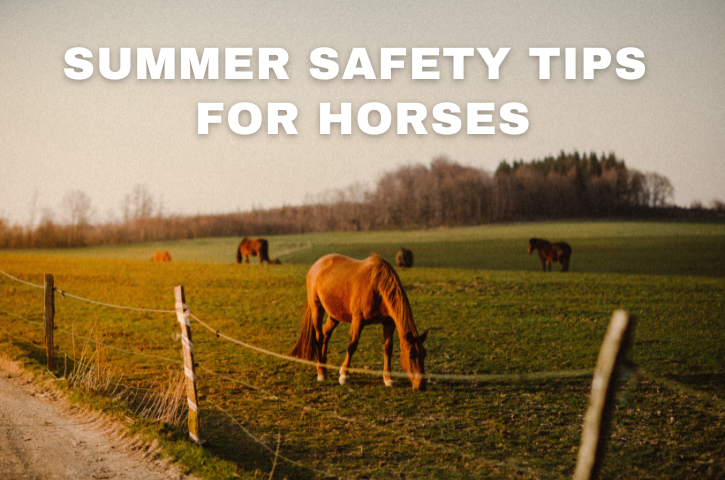Summer is an excellent opportunity to get out and spend some quality time with your horse. However, the summer heat can pose significant risks to your horse’s health. As warm weather approaches, it’s important to take some time to understand the risks and what additional safety precautions are necessary. Luckily, our team is here to help!
In this article, we’ll discuss our top summer safety tips for your horse.
Keep Your Horse Hydrated
When it comes to summer safety, keeping your horse hydrated is critical. For most horses, this means drinking at least eight to ten gallons of water a day. However, as the temperature increases, your horse can lose a significant amount of water through their sweat and may need to drink more to stay hydrated.
Always make sure your horse has access to clean drinking water. If you’re having trouble getting your horse to drink enough water to stay hydrated, you can offer an additional bucket of water flavored with Gatorade or apple juice.
Use Sun Protection
Just like people, horses can get sunburned. The pink areas around your horse’s eyes and muzzle are at the greatest risk, and it’s essential to reduce your horse’s UV exposure when possible.
One way you can do this is to use sunscreen containing zinc oxide. Sunscreen effectively blocks UV radiation and can be used on areas that are at increased risk of burning. Another great option to protect sensitive areas is a fly mask with built-in UV protection.
Take Steps to Prevent Heat Exhaustion
As the temperatures rise, so does your horse’s risk of heat exhaustion. Also known as heat stress, heat exhaustion occurs when environmental conditions cause your horse’s body temperature to rise above 103 F. When this occurs, horses can experience elevated heart rate, an elevated respiratory rate, profuse sweating, and lethargy. Heat exhaustion can also increase your horse’s risk of dehydration and colic.
To reduce your horse’s risk of heat exhaustion, avoid exercising your horse during the hottest parts of the day and look for shade when possible. You may also need to adjust your ride time, and intensity as your horse acclimates to the warmer weather.
If your horse becomes overheated, you can use cool water to help bring their body temperature down. A rectal thermometer can also be useful for monitoring your horse’s temperature. Continue cooling measures until their temperature is below 101 F.
Stay on Top of Your Horse’s Preventative Care
During the summer months, you may be traveling to horse shows or getting together for a relaxing trail ride with friends. While these are great opportunities to make memories with your horse, they can also put your equine companion at increased risk of disease.
Before traveling or socializing with new horses, make sure your horse is up to date on their vaccines. Some facilities and events will also require your horse to have a negative Coggins test and health certificate.
Final Thoughts
Whether you’re traveling to horse shows or hitting the trails, summer is a busy season for many horse owners. We hope these tips will help keep your summer festivities safe and allow you to spend some quality time with your equine companions. If you have additional questions about keeping your horse safe or would like to schedule an appointment, please give us a call.
Image credit: Pexels



